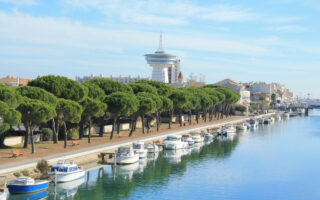9 Ways French Schools Are Different From the UK and US
Essential Reading


School is school the world over, right? Wrong! There are lots of subtle differences that you may notice when your kids move to a French school and while it’s good to embrace these differences, it doesn’t hurt to be prepared! Here are the most notable differences between systems in the UK or other international countries, and the school system here in France.
1. Lunch
As you would expect from living in the gastronomic capital of the world, school lunch is often a very different experience from the noisy dinner halls of the UK. Having visited several French schools in our local area and having worked for over twenty years in the UK (both Primary and Secondary) system, I now find myself working in a French ‘College’ (Secondary school).
The first thing that still strikes me is the noise level – or lack of it. Children and staff enjoying their food and chatting quietly. Bliss!
Some schools, especially in the countryside, pride themselves on home-cooked local and, of course, seasonal produce. Parfait!
Another difference is that lunch is a much longer affair. Rather than trying to rush the children through in as little as twenty minutes to avoid ‘down time’, which may (and often does) lead to disputes and problems in so many UK secondary schools; in France, time is taken over lunch. There is time for the children to savour, digest and play.
It is not unusual to have a three-course lunch (seriously!) and a well-balanced diet with plenty of vegetables is commonplace. French children, on the whole, eat a range of fruit and vegetables, and are often happy to eat a wide range of food groups. Good quality sausages with lentils, steak with green beans, and steamed fish with vegetables are all popular dishes. Obviously, meals do differ from school to school, but generally speaking, it is an incredibly positive experience.
Packed lunches are not generally readily accepted unless there are specific allergies or dietary requirements. Eating at home is an option, though, for those who live locally.
Most schools provide activities such as sports equipment and offer clubs where teachers and children engage together. There is a real sense of pause and relaxation. Many teachers actually take a proper break, too, which is lovely to see.
2. Stationery
You will receive a list of ‘fournitures’ that, as parents, you are expected to provide for your children. There is an annual child allowance sum allocated for this from the CAF to assist parents financially with back-to-school costs.
An A4 ream of paper, a box of tissues, a kitchen roll, paintbrushes, paints, scissors – you name it, and it’s probably on the list. And spares to delve into throughout the year – often kept in a named empty shoebox or a spare locker.
Amongst that list of equipment were some little surprises – Tippex or ‘Blanco’ is not something welcomed in many UK schools as it is too messy and often misused. Here, it’s a staple ingredient of the French pencil case, along with a compass, highlighters and an array of colourful pens and pencils.
A Fountain pen is all but a thing of the past in most Uk schools – here, it can be a common requirement, as is the expectation to write in French script/cursive. The beautiful joined-up handwriting is impressive.
3. Wednesday is a day off school
Yes – a day off! For our youngest, this was a blessing. A mid-week break to recharge his weary head and to relax together.
For our young teen at Secondary school, a half-day of lessons and a choice of sporting activities in the afternoon or an afternoon at home to catch up on homework.
Great childcare facilities exist with local Centre de Loisirs and other providers, so if both parents work, there should be plenty of options available to you.
4. You might need to supply toothbrushes and slippers!
This is unlikely be asked for throughout France, but it’s worth knowing that some schools do require the children to have a set of school slippers as outdoor shoes are not to be worn in classrooms. What a genius idea! No more sludgy wet floors on rainy, winter days.
Some areas also have a policy of teeth brushing after lunch just before returning to class. Children are expected to have a toothbrush, a cup for rinsing and toothpaste. The children build habits for life, and again, what a brilliant idea!
(note: be sure to check your local school’s policy, as these kinds of requirements will vary greatly!)
5. School assessments
These are fairly regular and often graded out of 20 to give a class average over a semester and, of course, an individual’s average in each given subject. Reports are usually annual with one parent’s evening/consultation too.
6. Contact with your school
In the UK and many other countries, teaching staff often deal with umpteen parental requests every single day (and credit to them!).
In France, there is comparatively less or maybe a different type of contact between home and school. Children are certainly encouraged to be more independent and mature and to work out ‘minor’ problems for themselves. That is in no way to say there is any less care involved; not at all. It is simply different, culturally. The teacher is the professional with their job to do. There is trust that they do it well and a sense that parents get in touch with the school only for more ‘serious’ matters and concerns.
That said, it is important to reiterate that schools are very open to helping children and their parents, so don’t be afraid to reach out if you do have questions and concerns.
7. Homework
Differing views and research studies aside, generally speaking, homework (and there can be a fair amount!) is regularly set and completed by the vast majority of students. Bravo!
8. The difference between public and prive
The fact is, there seems to be (comparatively speaking) quite a bit of staff absence or lack of staff availability in some (but not all) areas of the French public secondary system. It is worth checking out the exam results for your prospective local comprehensive college too. Just as you might do in your previous life by comparing local school league tables and discussing with friends and colleagues. Ask your local, trusted network for their honest opinion regarding what is important to you and your family from a school.
In France, when a teacher is absent, the students have private study, which will be supervised by a member of staff, but not necessarily a taught lesson. Supply teachers are only engaged after a period of long-term absence if one can be found.
A secondary school is a big decision for your child, and if changing schools mid-way through can be avoided by doing a little research beforehand, all the better.
On another positive note, there are many private schools that are available throughout France. Unlike the UK and some other countries, they are a much more affordable option than you might expect, and typically provide smaller class sizes and modern resources.
9. Step back in time
Be prepared for some technological differences if you move to the countryside! Tablets, mini whiteboards, interactive whiteboards, and a computer suite of classrooms were left all the way back in our UK Primary school the moment we stepped into a rural French Primary classroom with wooden ink desks and chalkboards. Although, this may not be typical across France, especially if you move to a city.
However, the difference is to be embraced in our book, and it was far from a bad experience. The Primary school had a real family feel, and it is an experience our family will treasure. The children are no less computer literate, and they learnt to play and respect others. They learnt to knit, to ski, they learnt what it is to live seasonally and to farm, amongst many, many other valuable experiences. And, the school was academically really strong too.
It is advisable, if possible, to visit the school prior to making your final decision and with so many things in life, if it feels right, it usually is right.
Ready for School in France?
As with any education system the world over, France is a very mixed bag, and the quality of your children’s education is largely dependent on your location and the current quality and availability of staff. However, with a little research and a little help from your friends, it is entirely possible to find a wonderfully supportive school where your children can be really happy. Vive la difference!
Share to: Facebook Twitter LinkedIn Email
By Carol Paylor
Leave a reply
Your email address will not be published. Required fields are marked *




REPLY